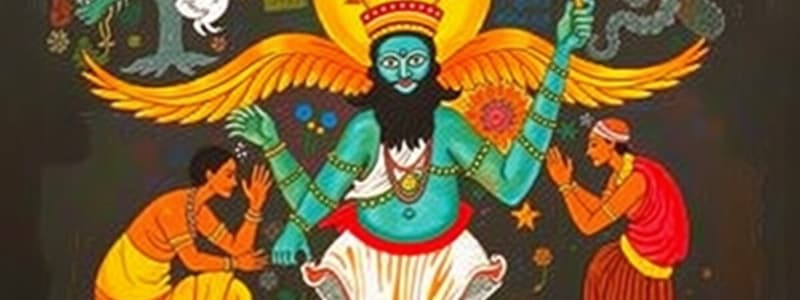Podcast
Questions and Answers
What is a superstition?
What is a superstition?
- A rational explanation of natural phenomena
- A belief not based on reason or logic (correct)
- A belief based on scientific evidence
- A practice that guarantees success
According to the provided content, what is India often called?
According to the provided content, what is India often called?
- The land of superstitions (correct)
- The land of science
- The land of reason
- The land of many religions
What does the itching of the palm supposedly indicate, according to some Indian superstitions?
What does the itching of the palm supposedly indicate, according to some Indian superstitions?
- Inflow of money (correct)
- Sure death
- Arrival of guests
- A sign of sickness
What is generally considered to be an unlucky number in the content?
What is generally considered to be an unlucky number in the content?
What is one potential negative consequence of believing in superstitions?
What is one potential negative consequence of believing in superstitions?
What is an example from the content of a superstitious practice involving animals?
What is an example from the content of a superstitious practice involving animals?
What does the cawing of a crow signify according to Indian superstition?
What does the cawing of a crow signify according to Indian superstition?
What is needed to move forward from superstitious practices?
What is needed to move forward from superstitious practices?
Flashcards
Superstition
Superstition
A belief or practice resulting from ignorance, fear of the unknown, or trust in magic or chance.
Fear of the Number 13
Fear of the Number 13
The irrational fear or belief in the ominous nature of the number 13.
Lucky Days
Lucky Days
The belief that specific days are more favorable for new activities or ventures.
Itchy Palm
Itchy Palm
Signup and view all the flashcards
Black Cat Crossing Path
Black Cat Crossing Path
Signup and view all the flashcards
Animal Fortune-Tellers
Animal Fortune-Tellers
Signup and view all the flashcards
Drawbacks of Superstition
Drawbacks of Superstition
Signup and view all the flashcards
Origin of Superstitions
Origin of Superstitions
Signup and view all the flashcards
Study Notes
- Superstitious people believe in superstitions, which are beliefs not based on reason.
- Superstition stems from irrational fear of the unknown.
- India is known as a land of many religions, some of which have led to the development of superstitions through tradition.
- People often follow superstitious practices due to blind belief, without questioning or studying them.
- India is called the land of superstitions because of the many superstitious practices
- Indian superstitions include:
- Itching palm indicates money inflow
- Cawing crow signals guest arrival
- Hooting owl signals sickness
- Wailing dog signals death
- Black cat crossing path means failure
- Drizzle at a wedding is good luck
- Specific days are good or bad for ventures
- The number thirteen is unlucky
- These practices originate from rare or chance events.
- These beliefs are generalized without verification.
- Superstitions can hinder free thinking, create fear, reduce self-confidence, and enslave individuals.
- Examples of superstitious practices in India:
- People use caged parrots to pick cards and predict the future.
- People use decorated cows or bulls to foretell success or failure.
- India is bound by superstitions in the 21st century, even among educated people.
- Progress is hindered by irrational and unscientific beliefs.
- Some terrible superstitious practices include:
- Sacrificing innocent children.
- Suspending humans on hooks as religious practice.
- Scourging and starving people to exorcise demons.
- It is important for future leaders and educated people can combat superstitions by:
- Raising their voices and using reasoning to debunk them as myths.
- Trusting in God and not fearing superstitions.
- Recognizing that all days and numbers are equal.
- Continuing with activities regardless of superstitious signs.
Studying That Suits You
Use AI to generate personalized quizzes and flashcards to suit your learning preferences.




